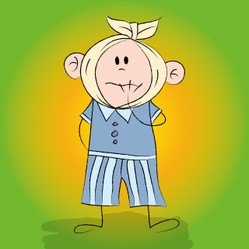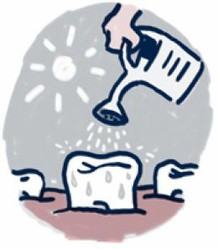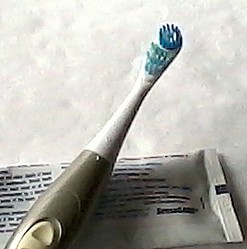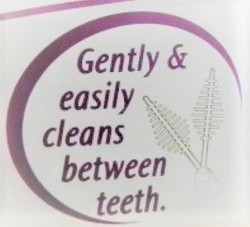Ranging from a distracting irritant to a full-blown ache, tooth sensitivity affects an estimated one in four American adults over age 18. But age does have some advantages. Tooth sensitivity actually may dip as people get older. To understand why, it’s important to know a bit about our teeth. Beneath the outer surface of your tooth’s enamel is a hard substance called dentin which protects the pulp chamber.

Understanding How to Stop Tooth Pain
by John84
Tooth pain is one of the worst afflictions known to man. To stop it, we must understand it.
Buddha survives. Well, one of his teeth does, at least. And nothing — not cremation, not the ravages of time has been able to eradicate it. Even now, more than 2,400 years after his death, disciples still regard Buddhas tooth as one of the world’s most holy relics.
A miracle? Hardly. Of all the parts of your body, your teeth are the most indestructible. Capable of enduring for more than 30 lifetimes, teeth tend to be so reliable that they are often taken for granted. Yet when teeth or gums hurt, they can quickly torment even the most stoic among us.
“Tooth pain is one of the worst afflictions known to man. At the very least, it is enough of a pain to drive some people to try extreme measures.”
Over the centuries, people have embraced dozens of wacky (and useless) remedies for their aching teeth such as placing cooked earthworms in the opposite ear from the ache, squashing a ladybug on to the tooth, and holding fresh cow dung on the side of the face where the tooth is aching.
These days, of course, dentistry is much more sophisticated and truly less torturous but your teeth — or the lack of them — can still be a major cause of pain as you age. Tooth sensitivity, toothaches, and denture soreness all can trigger intense discomfort for older Americans.
Ranging from a distracting irritant to a full-blown ache, tooth sensitivity affects an estimated one in four American adults over age 18. But age does have some advantages. Tooth sensitivity actually may dip as people get older. To understand why, it’s important to know a bit about our teeth.
Beneath the outer surface of your tooth’s enamel is a hard substance called dentin, which protects the pulp chamber, the heart of the tooth that is filled with blood vessels and nerves. As a tooth ages, the dentin thickens, the pulp chamber shrinks, and it becomes harder for nerves to detect painful sensations like hot coffee or cold air on the tooth’s surface.
Certainly some people in their early sixties develop tooth sensitivity. But as a general rule, teeth get less sensitive with age. In fact, so much that often that some minor restoration work on older people can be done without local anesthetic.
If you do develop tooth sensitivity, more than likely your gums have receded, exposing dentin along the root surface of the tooth, just below the enamel. Tooth sensitivity, whether it is persistent or just occasional, should be discussed with your dentist. It's important that the dentist rule out other causes of sensitivity such as tooth decay. Without proper treatment, tooth sensitivity can transform brushing and flossing into a painful ordeal and, in turn, lead to neglect of your teeth.
You might also like
Regrow Your Broken Or Damaged Teeth - What Dentist Don't Want ...Regrowing Teeth Is Not Just An Anomaly, It's Actually Something Our Body Has ...
Is The Spinbrush Toothbrush Worth It?Models of the Spinbrush have bristles that move, and advertise better home de...
Dental Toothpicks Get an UpgradeGive these plastic toothpicks a try. They are easier to use than floss and t...




 How to deal with Anxietyon 10/20/2015
How to deal with Anxietyon 10/20/2015
 What Causes Anxiety and Stresson 10/20/2015
What Causes Anxiety and Stresson 10/20/2015
 What is Metatarsalgia - Diagnosis and Treatmenton 09/10/2015
What is Metatarsalgia - Diagnosis and Treatmenton 09/10/2015
 What is Foot Pronationon 09/07/2015
What is Foot Pronationon 09/07/2015



Comments